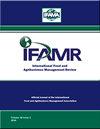Coffee cooperatives and cross-border side-sales in the Eastern Democratic Republic of Congo: two sides of the same coin
IF 1.5
4区 经济学
Q3 AGRICULTURAL ECONOMICS & POLICY
International Food and Agribusiness Management Review
Pub Date : 2023-07-03
DOI:10.22434/ifamr2022.0131
引用次数: 0
Abstract
In the Eastern DRC, coffee farmers combine the different sales outlets available to them. Cooperative members sell coffee to the cooperatives they belong to as well as to informal markets, which include a channel of illegal cross-border smuggling. In this conflict affected region, the informal cross-border markets persist irrespective of the presence of cooperatives. This paper seeks to understand the motivating factors of the sideselling behavior of coffee cooperative members. We study the coffee production and sales of 339 cooperative members in the region and use a double hurdle model to understand which farm characteristics relate to the side-selling behavior. The omnipresence of side-selling in the cooperatives suggest that the unstable political and economic environment is conducive to this co-existence of informal trade and cooperative membership. Side-selling seems a deliberate strategy by the farmers that is tolerated by the cooperatives. The results suggest that farmers who are in a more precarious situation are more inclined to engage with informal markets. This is further underscored by the effect of food insecurity and lack of credit. Hence, the informal market is a safety net that allows immediate payment of coffee in contrast to cooperatives that are more formally organized.刚果民主共和国东部的咖啡合作社和跨境侧售:同一枚硬币的两面
在刚果民主共和国东部,咖啡农将不同的销售渠道结合起来。合作社成员向他们所属的合作社以及非正规市场出售咖啡,其中包括非法跨境走私渠道。在这一受冲突影响的地区,不论是否存在合作社,非正规跨界市场仍然存在。本文试图了解咖啡合作社成员侧卖行为的激励因素。我们研究了该地区339个合作社成员的咖啡生产和销售情况,并使用双障碍模型来了解哪些农场特征与侧销行为有关。合作社中无所不在的附带销售表明,不稳定的政治和经济环境有利于非正式贸易和合作社成员的这种共存。侧卖似乎是农民有意为之的策略,而合作社却容忍这种策略。结果表明,处于更不稳定状况的农民更倾向于参与非正式市场。粮食不安全和缺乏信贷的影响进一步强调了这一点。因此,与更正式组织的合作社相比,非正式市场是一个安全网,可以立即支付咖啡。
本文章由计算机程序翻译,如有差异,请以英文原文为准。
求助全文
约1分钟内获得全文
求助全文
来源期刊

International Food and Agribusiness Management Review
AGRICULTURAL ECONOMICS & POLICY-
CiteScore
2.90
自引率
0.00%
发文量
0
审稿时长
>12 weeks
期刊介绍:
The IFAMR is an internationally recognized catalyst for discussion and inquiry on issues related to the global food and agribusiness system. The journal provides an intellectual meeting place for industry executives, managers, scholars and practitioners interested in the effective management of agribusiness firms and organizations.
IFAMR publishes high quality, peer reviewed, scholarly articles on topics related to the practice of management in the food and agribusiness industry. The Journal provides managers, researchers and teachers a forum where they can publish and acquire research results, new ideas, applications of new knowledge, and discussions of issues important to the worldwide food and agribusiness system. The Review is published electronically on this website.
The core values of the Review are as follows: excellent academic contributions; fast, thorough, and detailed peer reviews; building human capital through the development of good writing skills in scholars and students; broad international representation among authors, editors, and reviewers; a showcase for IFAMA’s unique industry-scholar relationship, and a facilitator of international debate, networking, and research in agribusiness.
The Review welcomes scholarly articles on business, public policy, law and education pertaining to the global food system. Articles may be applied or theoretical, but must relevant to managers or management scholars studies, industry interviews, and book reviews are also welcome.
 求助内容:
求助内容: 应助结果提醒方式:
应助结果提醒方式:


